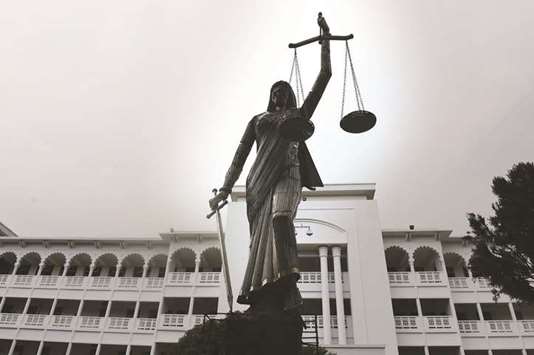Bangladesh yesterday reinstalled a controversial statue deemed un-Islamic by religious hardliners on the grounds of the Supreme Court, just days after its removal had sparked angry protests by secular groups.
The sculpture of a blindfolded, sari-clad woman holding scales had been in place for less than six months when authorities removed it early Friday under pressure from hardliners, who said it was based on the Greek goddess of justice.
Its removal from the front plaza of Bangladesh’s top court triggered violent clashes between police and secular groups, who saw the move as further evidence of creeping Islamisation in the officially secular country.
But the sculpture’s creator Mrinal Haque, who had accused authorities of bowing to hardline groups, said he was asked to reinstall the statue at a different location on the court grounds.
“We have just placed the sculpture in front of the Annex Building of the Supreme Court,” Haque said yesterday.
“I wasn’t given any clarification but was only ordered to relocate it,” he said, adding the new location was at the back of the court where hardly anyone could see it.
Opponents of the statue – who have been demanding for months that it be destroyed and replaced with a Qur’an – gathered outside the courthouse yesterday to protest against its return.
Several were arrested by police, Islamist groups said, drawing hundreds of protesters to Dhaka’s main mosque to demand their release.
“Police arrested nine of our peaceful activists. If they are not released immediately, we will call for a stronger countrywide movement,” said Hasibul Islam, spokesman for the student-based Islamist party Islami Shasantantra Chhatra Andolan.
The government risked “falling into danger” by trying to balance the interests of Islamist and secularist groups, he added.
Islamist groups held months of mass protests demanding the statue be removed.
Prime Minister Sheikh Hasina, who leads the secular Awami League party, initially kept her distance from the affair.
But she broke her silence last month to describe the statue as “ridiculous” after inviting top Islamist leaders to her residence.
Analysts say Hasina’s stand was intended to woo Islamists and conservative rural voters, before a general election
expected next year.
Bangladesh has seen increasing tensions between hardliners and secularists in recent years, with a number of atheist bloggers, religious minorities and foreigners murdered by
extremists.

A statue denounced by religious hardliners as u201cun-Islamicu201d is pictured on the grounds of the Supreme Court in Dhaka after it was reinstalled yesterday.
